Getting to know a new or new-to-you RV comes with a lot of questions. If you have an RV with a built-in refrigerator, then you might be wondering is it safe to run RV fridge on propane while driving.
While there are no laws preventing rv refrigerator operation while driving, there are still a few things you need to keep in mind to make sure you’re being safe.
In this article, we’ll explore the different types of RV refrigerators on the market, as well as how to make the most out of them while you drive down the road. This includes tips on how to RV fridge cold while driving.
What Are The Different Types Of RV Refrigerators?
Traditional RV refrigerators are known as “Absorption” refrigerators. Instead of using compressed freon like the refrigerator in your kitchen, RV refrigerators use a blend of special gasses to replicate an evaporation effect.
This, in turn, removes heat energy from the interior of the unit, to keep your food cool.
There are different ways to power an absorption refrigerator, which might influence the one that’s best for your RV or your personal needs.
Electric Propane Combination Refrigerator
Also known as “Two Way” refrigerators, most medium-to-large size RV absorption refrigerators are designed to run on propane as well as 12 Volt electricity.
If you are thinking about replacing or installing a new absorption refrigerator and your RV doesn’t have a current propane line you can run this type of refrigerator off of electricity.
Still, it’s worth noting that most of these units run best when they are fueled by propane.
Even if your RV doesn’t have a propane line running to the refrigerator area, you should consider having one professionally installed.
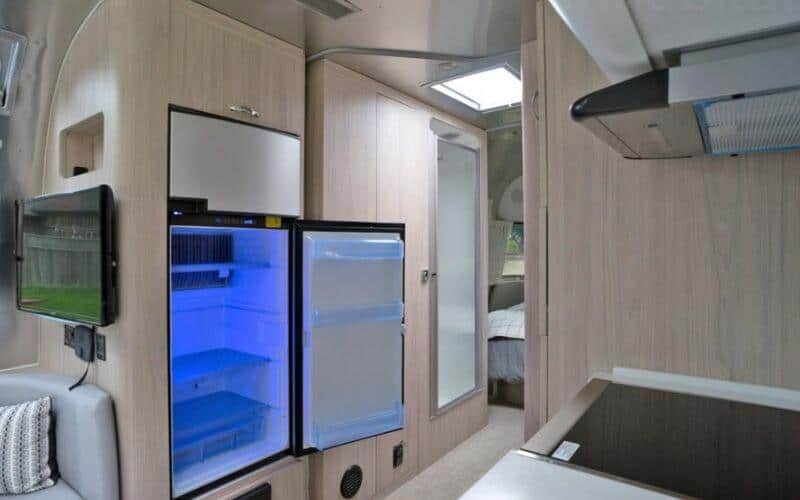
Many RV service and repair shops can do this for a very reasonable price.
Two of the more popular two-way refrigerators in the RV market today are the Norcold 5.5 offers 2-Way Refrigerator without Ice Maker and the Dometic “New Generation” RM3762. They cost between $900 to $1,500 and offer copious interior storage space paired with cooling efficiency.
Depending on the type of RV or motorhome you have, it might not be the wisest thing to run the refrigerator on propane while driving.
This is especially true for fifth wheels and camper trailers which you can’t ride in while underway.
I don’t know about you, but personally, I’m not always comfortable letting propane run without someone who can monitor it safely.
At the same time, you don’t want to be using your onboard or secondary generator while you are driving down the road.
In a situation like this, you can switch it over to run directly off the RV’s 12 Volt electric batteries.
While most motorhomes don’t tie these batteries into the engine battery, they can still run flat.
This can lead to other complications, not the least of which is decreased battery life, as well as possibly not having the electrical charge you need when you reach your destination.
Are There RV Appliances And Refrigerators That Run On Natural Gas?
Natural gas continues to grow in popularity as an alternative to propane. The United States has vast reserves of natural gas, which helps lead the way in developing new energy technology.
However, natural gas has less energy density than propane. This means it is primarily available through municipal gas lines.
At this time, there are some cities with natural gas busses, but this limited, new technology has yet to make much of a splash in RV appliance niche.
Is It Okay To Run RV Fridge On Propane While Driving?
From a legal standpoint, so long as your propane lines and the RV refrigerator are installed according to code, then there is no law against driving down the road with the RV propane refrigerator on. However, there is one caveat to keep in mind. Most states require you to turn off all gas appliances and sources of flame when you are refueling.
If law enforcement finds that your propane system or RV fridge is operating while you are at the gas pumps, you could get hit with a hefty fine. Not to mention the fact that it is indeed a serious danger.
If you are coming up to a gas pump, and your RV refrigerator is still running on propane, you might want to stop short of the pump first, and turn it off.
At the very least you should make sure it is off before you even think about touching the gas cap!
The Pros And Cons Of Using Propane While Driving
There are a few different pros and cons to consider when it comes to using propane to power your RV refrigerator while driving. Some of these can factor based on your personal preference.
This will depend on your personal opinion. Propane is the most commonly used. However, I will run you through the pros and cons of this method.
Pros
Cons
Most of the cons associated with using propane while driving is related to fire hazards, and potential explosions.
It’s a good idea to periodically inspect the propane lines and make sure that all tanks are tightly secured.
You should also consider having a professional inspection performed once a year, just to make sure that everything is in good working order.
If you are on the road and you do smell even a potential leak, you should not run the system until the leak is diagnosed and properly repaired.
Can I Use A Generator To Power RV Appliances While Driving?
Some larger RVs come with built-in generators, to supply them with electric power.
Smaller RV’s and many camper trailers require you to purchase or install an aftermarket generator.
A modest and inexpensive generator can usually produce between 2,000 to 3,000 watts.
Some inexpensive two-stroke generators can give you 5,000 Watts to work with.
Just like propane, there are pros and cons that you need to be mindful of when it comes to running a generator while driving.
Pros
Cons
What Are Some Of The Best Aftermarket RV Generators?
The Champion 3400- Watt Dual Fuel Inverter Generator will produce has more electricity than the average RV refrigerator needs.
The Generac GP3300 Portable Generator is relatively inexpensive and easy to use.
The Briggs & Stratton 30545 P3000 Power Smart Series is powerful and has a reputation for reliability. This gives you the ability to power multiple onboard electric appliances at the same time.
Are There “Green” Ways To Power An RV Refrigerator?
Solar panel and consumer-grade wind generator technology continue to evolve. Today there are several units available at the retail level.
You can find them in truck and RV accessory stores, or in the electrical department of large box hardware stores.
How To Keep An RV Fridge Cold While Driving?
If you aren’t comfortable with running your RV refrigerator on propane or a running generator, while you are underway, there are some things you can do to keep RV fridge cold while driving.
Using one or more of them can can also spare the overall drain on the batteries.
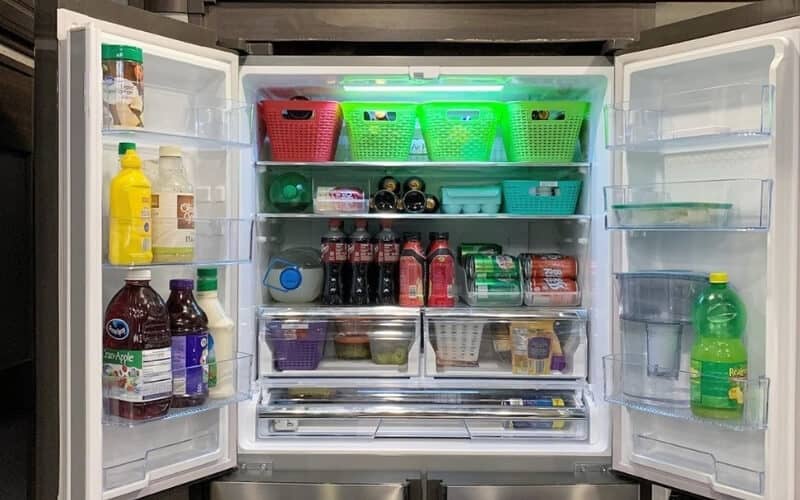
1: Turn The Refrigerator Off
Today’s quality RV refrigerators are designed to be thermally efficient. Most will only lose about 4 degrees Fahrenheit every eight hours, so long as you leave the door closed.
2: Add Ice Packs To The Top Shelf
A block or two of ice in a zip-top plastic bag will help keep the interior of the refrigerator cool when it’s not running.
Even if it is running the cold air pooling in the lower shelves will reduce the amount of energy the thermostat tries to draw from the batteries.
3: Set Your Refrigerator At The Coldest Setting At Night
As long as you aren’t opening and closing the door a lot during the day, the refrigerator should do a good job keeping things cold on its own.
If there are a few things that you want to keep on hand throughout the day, such as cold drinks, try keeping them in a small side cooler.
4: Carefully Choose What You Keep In The Refrigerator
Opening and closing the door to get things you need during the day will increase the rate at which the refrigerator warms up.
Keeping simple things like ketchup packets and condiments in a side cooler will also give you more space for things that absolutely need to stay cold.
In Conclusion
While there aren’t any laws against running a propane system or a generator while you drive, there are some common-sense things to keep in mind.
If you do want to run the propane, make sure you turn it off before pulling up to the fuel pumps.
If you do want to run the generator while you are going down the road, make sure that the exhaust gasses are vented properly.
With the use of a simple side cooler for drinks and other frequently used items, you should be able to keep your refrigerator safely cool, while you explore the great open road.
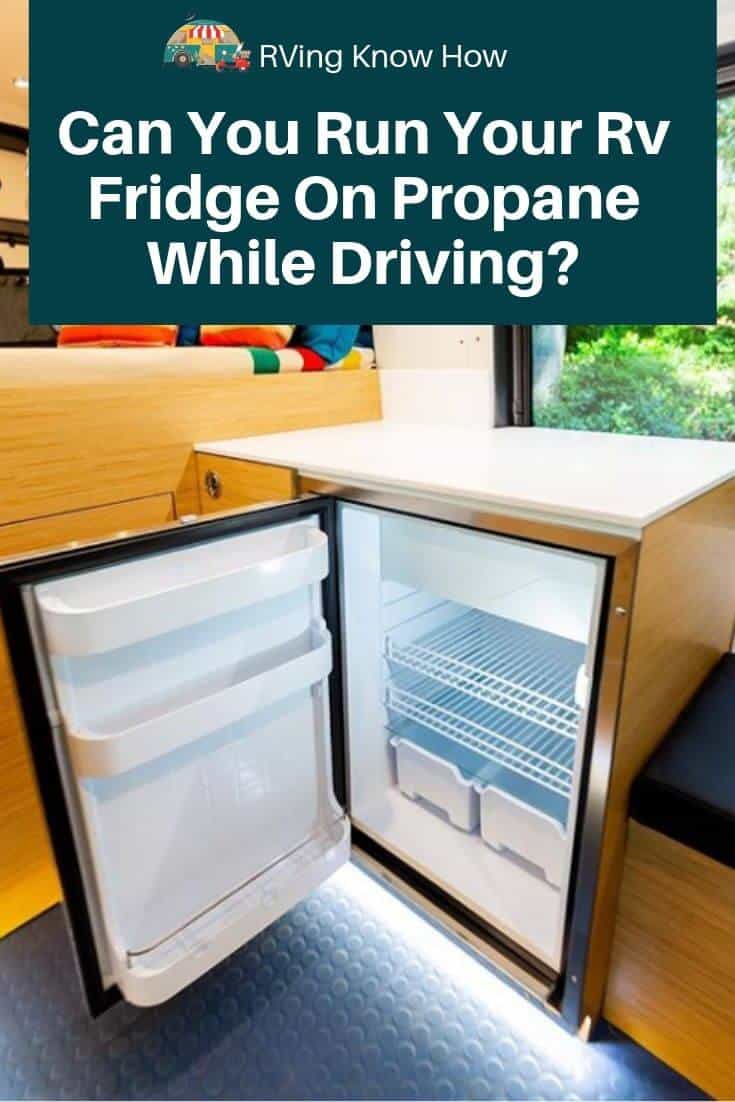


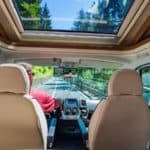

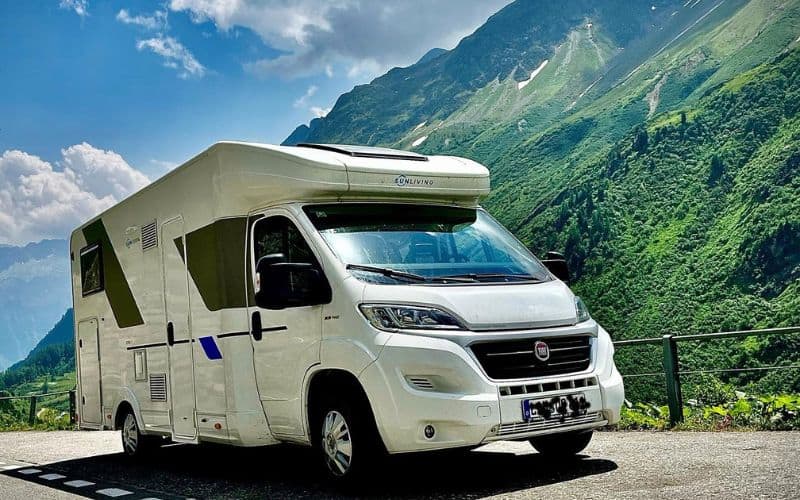
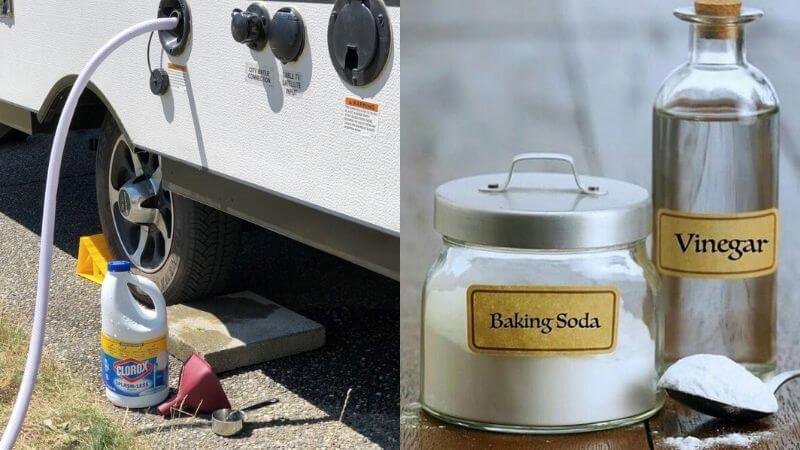
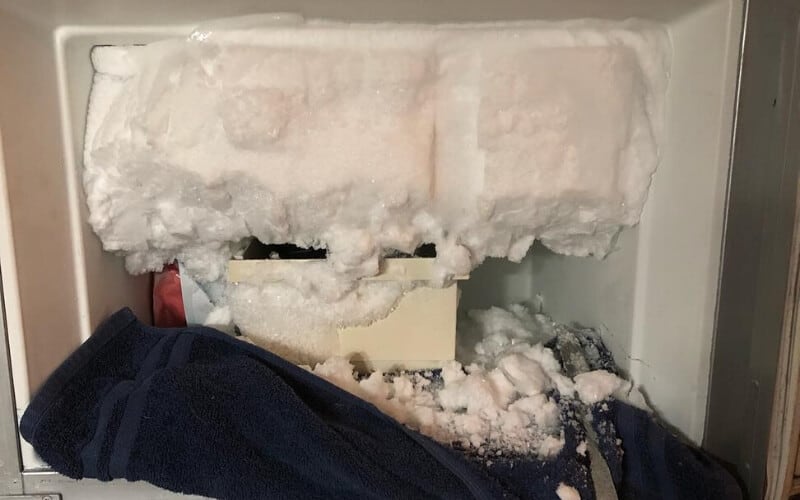
1 Comment
Vanessa Simmons
3 years agoUnless you have an inverter your fridge won’t run off the batteries. The 12 volt only works in combination with the propane to get the absorption system running. An inverter will operate it off of the 120 volt plug but it will drain your batteries unless you have a good connection from the vehicle to keep the batteries charged.